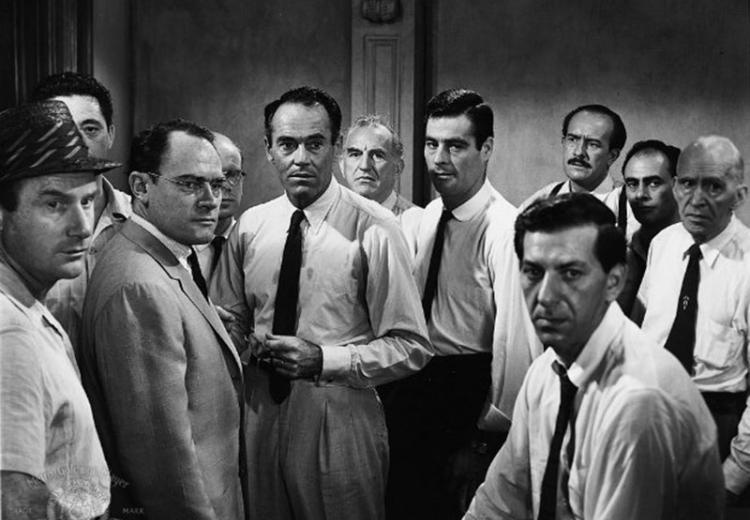Activities for Twelve Angry Men

Twelve Angry Men
Screenshot from film
Activity 1. Discussion of the play/film
Begin the lesson by assigning students to either read or view Twelve Angry Men. Distribute the following questions beforehand. These same questions may serve as the basis for either group or class discussion of the play/film.
- Who was chosen to serve on the jury?
- Was the jury in this case representative?
- Was the jury in this case impartial?
- Is there a difference between representative and impartial? If so, is the difference critical?
- What were the primary concerns of the jurors?
- What factors influenced the jurors as they discussed and decided this case?
- Did the jurors believe that they were doing their job responsibly?
- What factors convinced them to change their votes?
- Which of these concerns had a constitutional basis?
- What, ultimately, was the crucial factor in determining the outcome of the trial?
- What did the jurors learn while deliberating the case?
- About the trial?
- About themselves?
- About the Constitution?
- Does this play/film leave you feeling concerned or confident that a "trial by jury" results in a fair trial? What are the reasons for your position?
Activity 2. Analysis of the constitutional provisions
The right to trial by jury is specifically mentioned in the Constitution of the United States in Article III and Amendments V and VI. Relying on Amendment XIV, the Supreme Court has determined that the provisions in the Constitution apply in state criminal courts. In practical terms, this also means that Supreme Court decisions relating to the right to trial by jury also apply in state courts.
Carefully review the rights guaranteed to individuals accused of criminal acts and, in the process, make two lists: (1) provisions that relate directly to the right to a trial by jury and (2) provisions that the jurors themselves should take into account in their deliberations.
Working from these lists, the class as a whole should discuss which of these constitutional provisions were raised by Twelve Angry Men and whether the play/film enabled them to understand better the importance of these rights. During the discussion, students should be encouraged to make specific references to the play/film.
The relevant provisions in the Constitution of the United States can be found at:
- http://avalon.law.yale.edu/18th_century/art3.asp
- http://avalon.law.yale.edu/18th_century/rights1.asp
- http://avalon.law.yale.edu/18th_century/amend1.asp#14
Gideon v. Wainright
One of the questions raised during the deliberations by the "twelve angry men" was the legal representation that had been provided for the young man accused of murdering his father.
In 1963, the Supreme Court handed down the first in a series of cases dealing with the constitutional right to counsel. The case of Gideon v. Wainwright drew widespread attention, especially with the publication a year later of Gideon's Trumpet by New York Times legal affairs correspondent Anthony Lewis. The book was made into a film in 1980.
Of particular interest is Abe Fortas' oral argument before the Supreme Court in defense of the right to counsel, in particular the need to provide counsel for those unable to afford a lawyer. This can be accessed on the Oyez.org website.
This clip (about an hour in length) can be assigned as homework or played in class, depending on students' access to the internet and/or class time that may be available for this purpose.
- What is meant by the term federalism as used in this argument? How does the principle of federalism relate to the right to counsel? What are the two views of how this principle should be applied?
- What precedents does Fortas cite in arguing his case for Gideon?
- What evidence does Fortas use to support his position that Betts v. Brady be overturned? What evidence is most persuasive? Why?
- Of what relevance is the 14th Amendment to this case?
- What problems do the justices anticipate in implementing a policy of providing counsel for those unable to pay for legal representation?
- Which description best describes Fortas: idealist or pragmatist?
